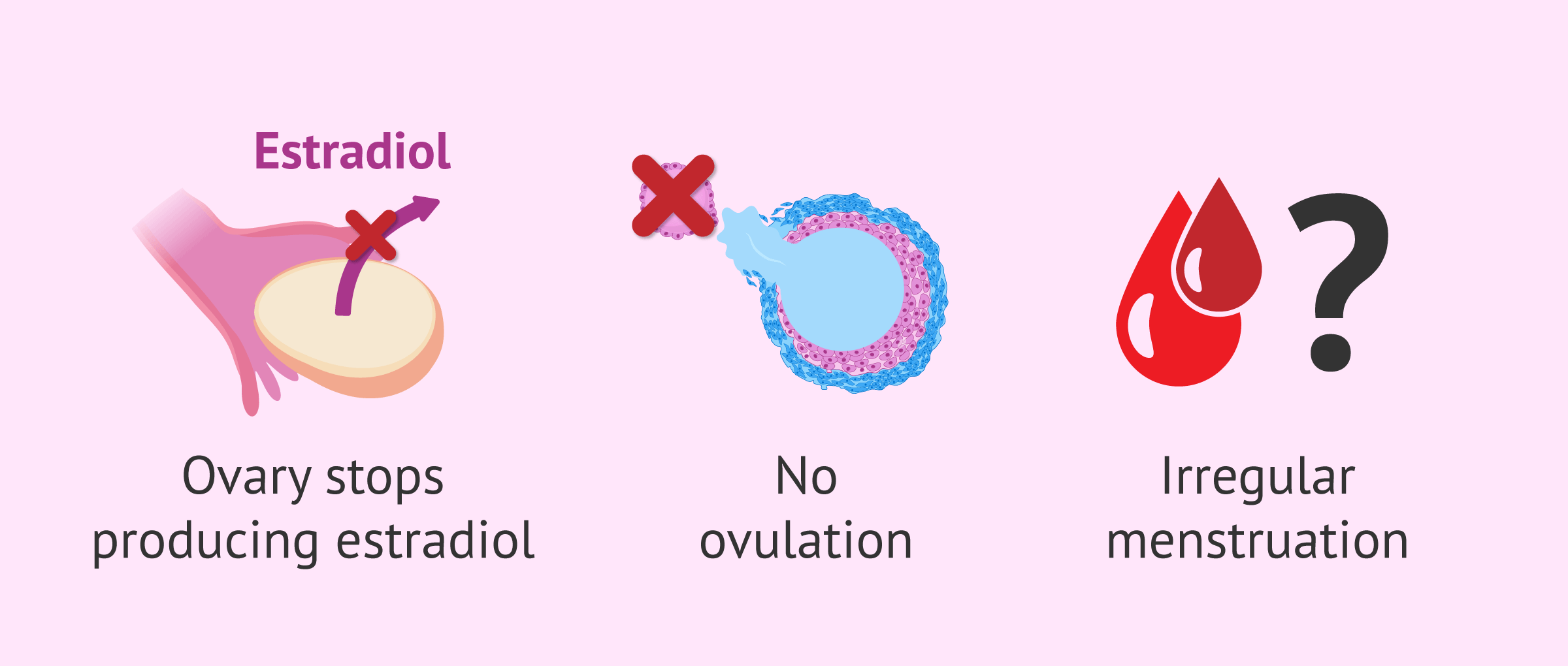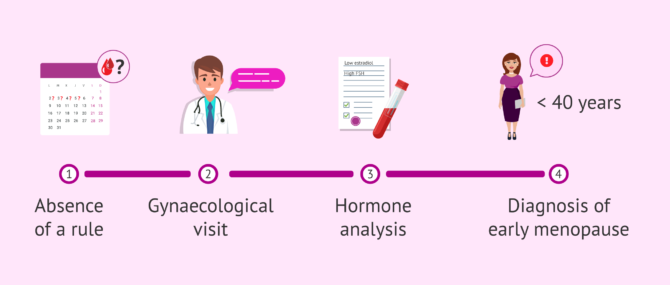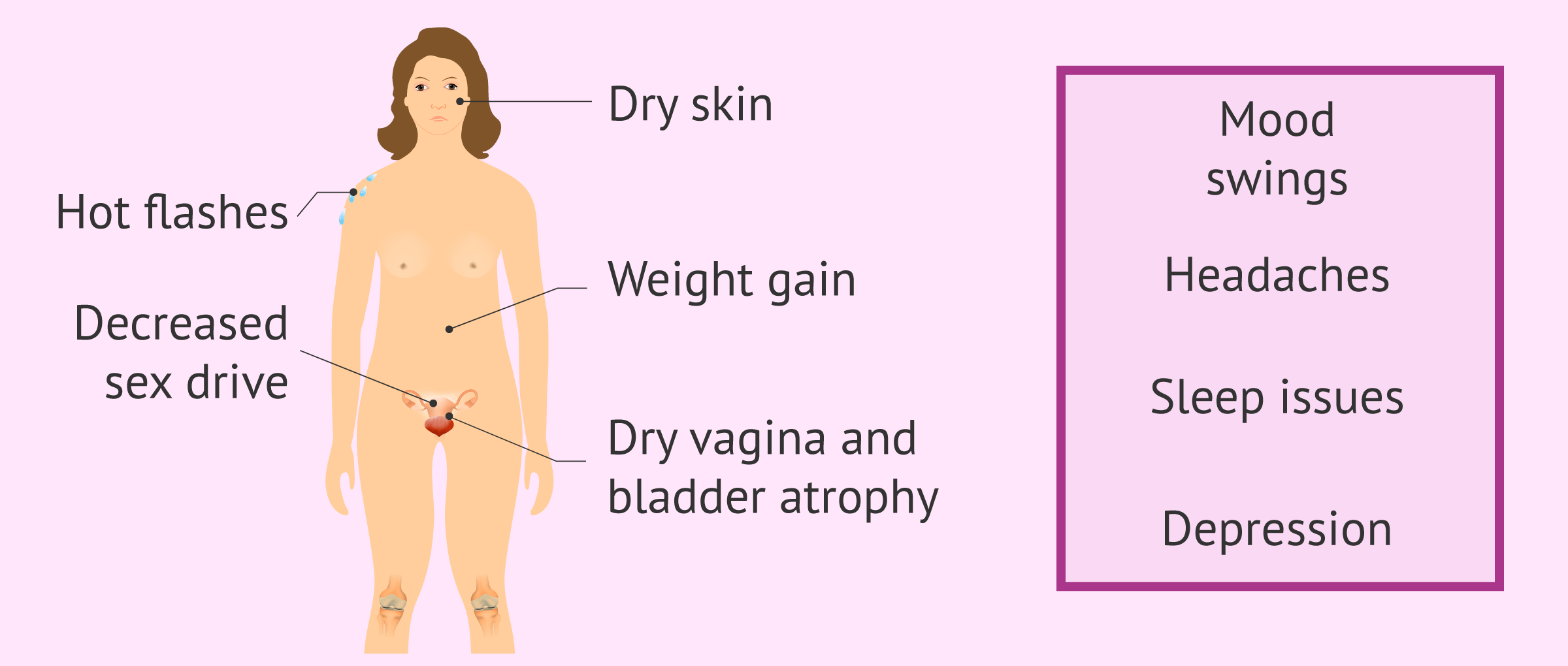Early menopause is the termination of reproductive activity in women under 40. The ovaries stop working, there is no ovulation, and eventually menstruation will disappear.
This condition is also known as premature ovarian failure (POF), which is a cause of infertility in 1% of women.
The symptoms and consequences of early menopause are the same as those of menopausal women over 50.
Provided below is an index with the 10 points we are going to expand on in this article.
- 1.
- 2.
- 3.
- 4.
- 5.
- 6.
- 7.
- 7.1.
- 7.2.
- 7.3.
- 7.4.
- 7.5.
- 7.6.
- 7.7.
- 8.
- 9.
- 10.
What is early menopause?
The early menopause refers a woman's transition from being fertile to not being fertile at an early age, before the age of 40. Some women suffer from early menopause even before the age of 30.
The average age at which women reach menopause is 50. Related Article: What Is Menopause? Age, Causes, Symptoms & Treatment.
Premature menopause results in the loss of ovarian function. The consequences of this are as follows:
- The ovary will stop producing estradiol
- Menstruation bleedings will become irregular until they disappear
- Ovulation will not occur
- The affected woman will suffer from infertility
Causes
The main cause of menopause at an early age is early ovarian failure, which is caused by different factors that are difficult to determine.
In other cases, the cause of premature menopause is more obvious, such as when the ovaries are removed.
In the next section, we are going to discuss all the possible causes of early menopause in women:
- Genetic alterations
- women suffering from Turner's syndrome or Fragile X syndrome.
- Family history
- if the woman's mother or sister has gone through early menopause, there is a greater chance that it will occur in the same family.
- Autoimmune diseases
- hypothyroidism or rheumatoid arthritis. The immune system produces antibodies against the ovary, which destroys or alters the ovarian reserve.
- Toxic materials
- pesticides, alcohol, tobacco, solvents, etc.
- Viral infections
- like malaria or chickenpox.
- Cancer treatments
- chemotherapy and radiation therapy. Depending on the intensity of these treatments, ovarian failure may be reversible or irreversible.
- Surgeries
- hysterectomy in which the ovaries are removed along with the uterus and tubes. Partial removal of the ovary is also possible during treatment of endometriosis or teratoma.
Sometimes it is not possible to know the causes that have led women to suffer from early menopause. This is what is known as idiopathic ovarian failure.
Diagnosis of early menopause
The first warning sign in women is the disappearance of menstruation or the alteration of menstrual periods. To clarify this cause, a gynecological examination is most recommended in this case.
A blood test will then be required to assess the patient's hormone profile. Low levels of estradiol, as well as increased follicle-stimulating hormone (FSH), will confirm that a woman suffers from early menopause.
For more detailed information on this topic, we recommend you read the following article: What are normal hormone levels in women?
What are the signs of early menopause?
The symptoms that women suffer from in the early menopause are very similar to those that occur in the climacterium of older women. Most of them can be attributed to the lack of estrogen.
Amenorrhea, or the absence of periods, is the most alarming symptom, especially in young women who do not usually have menstrual disorders.
Menstrual irregularities begin a few months before the onset of menopause; there are changes in bleeding and duration to the point where the woman stops bleeding.
Other characteristic symptoms of PFO are the following:
- Hot flushes
- Headache
- Night sweats.
- Sleep Alterations
- Palpitations and tachycardia
- Emotional disturbances: depression, irritability, etc.
- Vaginal dryness and dry skin
- Dyspaurenia: Painful Sex
- Decreased sex drive
- Urinary problems: incontinence, bladder irritability, infections, etc.
- Weight gain: accumulation of fat in the belly area
In any case, if there is an imbalance in menstruation or discomfort, it is advisable to consult a specialist to find out the best way to proceed.
Risks and consequences
In addition to the symptoms and discomfort we have discussed in the previous section, menopause also has long-term consequences for the women's health.
Hormone deficiency causes alterations in the regulation of many functions in the female body. The most serious problems that can happen because of this are the following:
- Increased tendency to develop osteoporosis and joint pain
- Risk of cardiovascular disease
- Risk of breast cancer
- Sterility
Women with POF who have not been able to become pregnant naturally can resort to in vitro fertilization (IVF) to try to retrieve some mature eggs with ovarian stimulation.
IVF with donor eggs is probably the most confusing of all fertility treatments, and oftentimes, a misleading one. Transparency is one of our strict selection criteria when it comes to recommending fertility clinics to our readers. You can create your Fertility Report now to filter clinics based on our selection criteria and get an individual report based on your preferences with answers to your queries and most importantly, to prevent potential frauds.
However, this is not possible in cases where the ovarian reserve is severely affected. In this case, Egg donation will be the best option to become mother, since the uterus will be able to maintain the pregnancy with the appropriate hormonal treatment.
Treatment of early menopause
There is no treatment to make the ovaries functional again. However, it is important that a woman be treated with hormone therapy once early menopause is diagnosed.
By combating low estrogen levels, it will be possible to alleviate the symptoms of menopause, as well as prevent the possible risks associated with hormone deficiency.
The main solution, therefore, is hormone replacement therapy. Normally, this treatment consists of the administration of estrogens, but the combined contraceptive pill (estrogen-progesterone) can also be used.
There are also natural therapies without hormones to combat the symptoms of menopause. For example, soy isoflavones and hops are phytoestrogens with many beneficial properties.
Last but not least maintaining a balanced diet and practicing sports are essential aspects of maintaining health in menopausal women.
FAQs from users
What is the main cause of early menopause?
Early menopause or early ovarian failure consists of the termination of ovarian activity before the age of 40. It occurs in about 1% of women. In most cases, 63% of cases, as indicated by the Spanish Association for the Study of Menopause, the cause is unknown.
The second most common cause of early ovarian failure is genetics, while other causes of premature ovarian failure are: chemotherapy or radiotherapy treatments in women with oncological processes, endometriosis, metabolic or autoimmune diseases or infections.
Read more
Is natural pregnancy possible with early menopause?
Yes. When ovarian failure is spontaneous and the woman has a normal karyotype, the ovary may continue to function intermittently for some time and ovulation may occur. Thus, between 5% and 10% of women achieve a natural pregnancy even with early menopause.
In many cases, these pregnancies are not intended. Women think that by not having their period they can no longer get pregnant, which is not entirely true.
What psychological problems can bring premature ovarian failure?
Women with early menopause often have trouble accepting this new situation, especially young girls who have not yet had children. The risk of anxiety and depression is very high.
Therefore, it is very important that these women receive adequate information to assimilate it and, if necessary, to resort to psychological support as well.
Can you get pregnant with donor eggs after menopause?
Yes, it is possible to have a baby after menopause, a phenomenon known as postmenopausal pregnancy. Menopause is defined as the cessation of menstruation, which means the loss of ovarian activity. However, this does not affect the uterus, which is still functional, and able to carry a pregnancy. This is perfectly possible with either donor eggs from a young girl, the woman's own previously frozen eggs, or the couple's frozen embryos, if any.
How do I know if I have early menopause?
The first sign of early menopause is the alteration of the menstrual cycle and the absence of periods. Also, if you are trying to get pregnant without success, the cause of infertility may be related to ovarian failure.
To confirm whether a woman really suffers from early menopause, it will be necessary to have a gynecological check-up and a hormonal examination.
Can fertility drugs cause early menopause?
No, ovarian stimulation does not affect the donor's fertility, as eggs that would have degenerated end up developing fully, so it does not reduce the number of eggs which would have grown naturally, which is to say, the chances of getting pregnant naturally in the future do not diminish.
Can I have early menopause at 42?
In principle, early menopause refers to the cessation of ovarian activity before a woman reaches the age of 40. Therefore, after this age, it would no longer be considered early menopause.
Suggested for you
As a woman approaches menopause, the ovarian reserve is depleted, making it more difficult to achieve a pregnancy. We recommend reading more about this topic in the following post: How Many Eggs Does a Woman Have? Your Egg Count by Age
As we have said, it is possible to assess the ovarian reserve and the state of female fertility through a hormonal blood test. You can find out in detail what this is all about here: Can a Woman’s Egg Count Be Measured with a Blood Test?
We make a great effort to provide you with the highest quality information.
🙏 Please share this article if you liked it. 💜💜 You help us continue!
References
Amanda J Vincent, Joop S Laven. Early Menopause/Premature Ovarian Insufficiency. Semin Reprod Med. 2020 Sep;38(4-05):235-236. doi: 10.1055/s-0041-1722924. Epub 2021 Jan 25 (See)
Claudio Hernández-Angeles, Camil Castelo-Branco. Early menopause: A hazard to a woman's health. Indian J Med Res. 2016 Apr;143(4):420-7. doi: 10.4103/0971-5916.184283 (See)
Menoguía. Menopausia precoz. Asociación Española para el Estudio de la Menopausia. 2014
Shannon D Sullivan, Philip M Sarrel, Lawrence M Nelson. Hormone replacement therapy in young women with primary ovarian insufficiency and early menopause. Fertil Steril. 2016 Dec;106(7):1588-1599. doi: 10.1016/j.fertnstert.2016.09.046 (See)
Sheryl A Kingsberg, Lisa C Larkin, James H Liu. Clinical Effects of Early or Surgical Menopause. Obstet Gynecol. 2020 Apr;135(4):853-868. doi: 10.1097/AOG.0000000000003729 (See)
Speroff, L., & Fritz, M. A. (2005). Clinical Gynecologic Endocrinology and Infertility. Lippincott Williams & Wilkins.
Qin, Y., Jiao, X., reproduction, J. S. H., 2015. (2015). Genetics of primary ovarian insufficiency: new developments and opportunities. Academic.Oup.com, 21(6), 787–808
FAQs from users: 'What is the main cause of early menopause?', 'Is natural pregnancy possible with early menopause?', 'What psychological problems can bring premature ovarian failure?', 'Can you get pregnant with donor eggs after menopause?', 'How do I know if I have early menopause?', 'Can fertility drugs cause early menopause?' and 'Can I have early menopause at 42?'.










